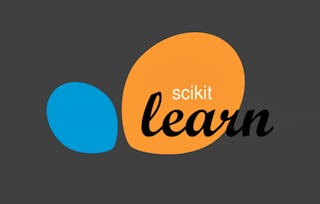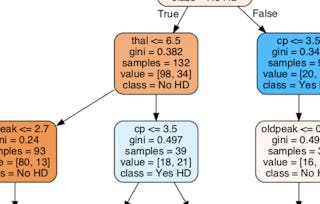In this lesson we will built this Support Vector Machine for classification using scikit-learn and the Radial Basis Function (RBF) Kernel. Our training data set contains continuous and categorical data from the UCI Machine Learning Repository to predict whether or not a patient has heart disease.

Support Vector Machines in Python, From Start to Finish

Support Vector Machines in Python, From Start to Finish

Instructor: Josh Starmer
6,366 already enrolled
Included with
(162 reviews)
Recommended experience
What you'll learn
Import data into, and manipulating a pandas dataframe
Format the data for a support vector machine, including One-Hot Encoding and missing data.
Optimize parameters for the radial basis function and classification
Build, evaluate, draw and interpret a support vector machine
Skills you'll practice
Details to know

Add to your LinkedIn profile
Only available on desktop
See how employees at top companies are mastering in-demand skills

Learn, practice, and apply job-ready skills in less than 2 hours
- Receive training from industry experts
- Gain hands-on experience solving real-world job tasks
- Build confidence using the latest tools and technologies

About this Guided Project
Learn step-by-step
In a video that plays in a split-screen with your work area, your instructor will walk you through these steps:
-
Import the modules that will do all the work (4 min)
-
Import the data (3 min)
-
Missing Data Part 1: Identifying Missing Data (4 min)
-
Missing Data Part 2: Dealing With Missing Data (5 min)
-
Format Data Part 1: Split the Data into Dependent and Independent Variables (3 min)
-
Format the Data Part 2: One-Hot Encoding (11 min)
-
Format the Data Part 3: Centering and Scaling (2 min)
-
Build A Preliminary Support Vector Machine (2 min)
-
Optimize SVM with Cross Validation (2 min)
-
Building, Evaluating, Drawing, and Interpreting the Final Support Vector Machine (10 min)
Recommended experience
Some Python and the concepts behind Support Vector Machines, the Radial Basis Function, Regularization, Cross Validation and Confusion Matrices.
10 project images
Instructor

Offered by
How you'll learn
Skill-based, hands-on learning
Practice new skills by completing job-related tasks.
Expert guidance
Follow along with pre-recorded videos from experts using a unique side-by-side interface.
No downloads or installation required
Access the tools and resources you need in a pre-configured cloud workspace.
Available only on desktop
This Guided Project is designed for laptops or desktop computers with a reliable Internet connection, not mobile devices.
Why people choose Coursera for their career

Felipe M.

Jennifer J.

Larry W.

Chaitanya A.
Learner reviews
- 5 stars
75.30%
- 4 stars
16.04%
- 3 stars
7.40%
- 2 stars
0.61%
- 1 star
0.61%
Showing 3 of 162
Reviewed on Oct 17, 2020
Short concise and precise course for learning SVM.
Reviewed on Jul 20, 2020
I am a beginner in this area but I learned a lot in this course.
Reviewed on Jun 8, 2020
This is a very good course to start with SVM.I now know the basic coding for SVM.Thank You sir.
You might also like

Open new doors with Coursera Plus
Unlimited access to 10,000+ world-class courses, hands-on projects, and job-ready certificate programs - all included in your subscription
Advance your career with an online degree
Earn a degree from world-class universities - 100% online
Join over 3,400 global companies that choose Coursera for Business
Upskill your employees to excel in the digital economy
Frequently asked questions
By purchasing a Guided Project, you'll get everything you need to complete the Guided Project including access to a cloud desktop workspace through your web browser that contains the files and software you need to get started, plus step-by-step video instruction from a subject matter expert.
Because your workspace contains a cloud desktop that is sized for a laptop or desktop computer, Guided Projects are not available on your mobile device.
Guided Project instructors are subject matter experts who have experience in the skill, tool or domain of their project and are passionate about sharing their knowledge to impact millions of learners around the world.





